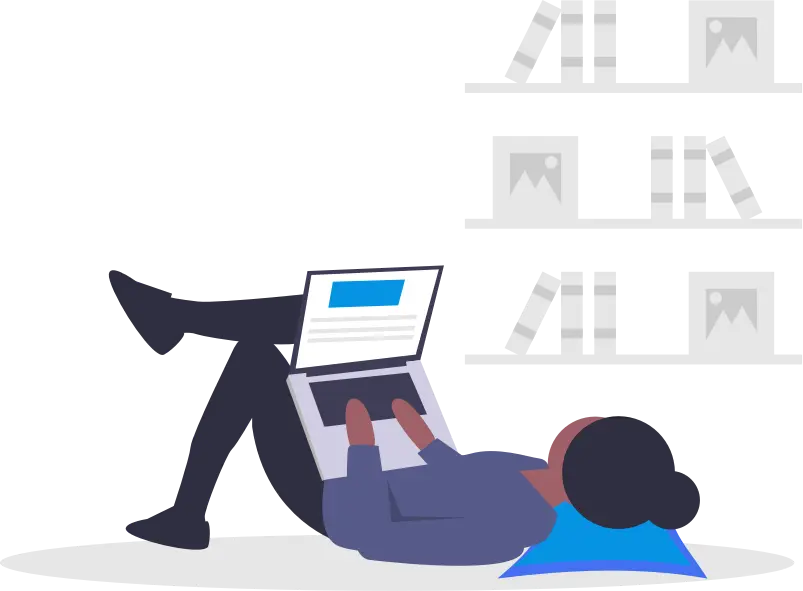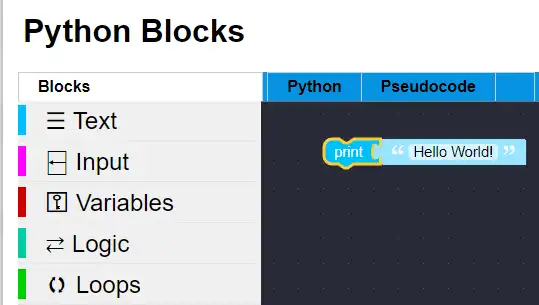Learn Computer Science – Free
Free CS resources
Join the growing club of learners, studying computer science for free!
Enjoy learning new skills with our great selection of CS tools and content.
Earn points, certificates and rewards as you learn to show what you have learned.
Free online education so you can study yourself at home.
Use our free computer science educational resources to help you get ahead in the subject.
Everyone learns differently and we have lots of different work to help everyone succeed.
Subscribe to our newsletter!
✔️Stay up to date when we launch new content.
✔️Get exclusive content only available to Newsletter subscribers
Free computer science educational resources

Free resources for students to learn Python programming, Parsons puzzles and online CS courses
Welcome to the website – the home of free Computer Science education resources. Here you will find lots of useful resources including:
- Free KS3 computer science resources
- Free KS4 computer science resources
This site is designed to be accessed by both pupils and teachers – simply click on the relevant menu link above.
Expertly crafted by a fully qualified UK teacher
The website and content has been put together by a fully qualified teacher based in the UK who has hands on experience in the subject.
This experience and knowledge of the subject has been brought together to provide an online learning platform that is subject specific and helps students to remember the key parts of the curriculum in a fun and interesting way.
The content on the site has been built to make it specific to the different GCSE exam boards and to cover the specific components of the UK national curriculum.
Engaging and fun
We’ve tried to make our resources both engaging and fun by implementing a points based system into the site. By completing quizzes and tasks, students can earn CS points which they can use to show their dedication to learning.
The aim in the future is to be able to offer prizes for top earning pupils and schools to help learners engage in the subject.
Pupils will also be able to earn virtual badges and certificates for their achievements in the subject.
Actively developed
Unlike other websites, this one is being actively developed which means that new content is constantly being added and edited to make it even better. The site has come a long way since its first inception back in 2018!
We’re constantly looking at how we can improve the site and what we can add that will be awesome for both teachers and for students.
Our goal is to provide tools and resources at no cost for students or teachers so that more people can benefit from the subject and get educated.
While the site does not charge, we’re always happy to receive donations to help pay our server and development fees and it’s really appreciated!
Free KS3 computer science resources

Python Blocks
Aimed at KS3 to KS4 computer science students, Python Blocks aims to make the process of coding in python easier and to make the transition from coding in blocks to text based languages simple. The advantage of Python Blocks is that students don’t need to worry about syntax when constructing larger projects – all syntax is taken care of for them.
The app is also really useful for the rapid development of programs due to its simple drag and drop interface that can be configured on the fly. Student’s who have used Scratch or Micro:Bits before will instantly feel at home with the interface which works in exactly the same way as these popular applications.
Python Online
Students can teach themselves how to program directly in the browser using our website based coding platform! This is an excellent way for schools to reduce security issues and save technicians time from installing IDE’s onto the school system. This web implementation functions almost entirely the same as an installed version and is suitable to meet the requirements of both KS3 and KS4 curriculums.
The app has been designed to be lightweight, simple but effective. It features code and syntax highlighting, accessibility features like high contrast and text enlargement and the ability to save and load work from a local location.
Online Courses
Great for students to learn at their own pace – the online courses offer a number of different topics which are being added to all the time. The courses are also organised by age group for example 11+, and by exam board where appropriate for example OCR or AQA.
While taking online courses, students will gain the knowledge needed using a variety of different media such as text, images, audio and videos. They will also be tested on their subject knowledge throughout to check for understanding in the form of mini quizzes. These mini quizzes act as a progress check for the student to make sure they are not just rushing through the pages but that they are actually understanding what they are reading.
Parsons Puzzles
An excellent addition to Python blocks and our online coding platform – students need to put pre-written lines of code into the correct order. This allows students to think about the design of the algorithm with less time spent worrying about syntax.
Research has shown that Parsons Puzzles are effective at reducing cognitive load for students new to programming and can help in the learning process. Our programming parsons puzzles help students to apply algorithmic concepts and help them to think in a logical manner in order to build the algorithm given.
Students are given a description of an algorithm to start them off, which describes how the program should work. All of the code that they will need is provided and students need to decide how the code fits together so that the program operates the same as the algorithm description. Students can either choose to do a simple Parsons Puzzle which simply involves putting the code in the correct order, or they can have a go at trying to get the code in the correct order with the correct indentation in the challenge series of the Parson Puzzles.
The puzzles are currently available in both Python and VB.Net languages with more languages planned.
Logic Gate Puzzles
Logic gates are an essential part of the curriculum and our website provides logic gate puzzles that allow students to build logic gate diagrams based on truth tables and also tests students knowledge on truth tables by asking them to fill in truth tables from a given logic circuit.
These logic gate puzzles are an excellent way to test students knowledge and for each puzzle, students can get feedback on their answers when they check their work.
Representation puzzles
From binary to decimal and hex, we have a number of tools that test pupils on their ability to convert from different number systems. These include both online tools and printable work sheets for students which are randomly generated. The random nature of these tools and work sheets ensure that teachers don’t have to sit and think about questions then work out the answer as it is all done for them and ensures students get a range of questions. There are also options for single digit and double digit hexadecimal and 4 digit and 8 digit binary conversion to ensure that every learner has a chance to learn.
As well as number conversion, the site also includes binary addition puzzles. These puzzles are randomly generated and include addition to both 4 digit and 8 digit. These puzzles also deal with binary overflow.
Caesar Cipher Wheel
Our online Caesar cipher wheel is a popular tool on our website and allows students to encrypt and decrypt messages online instead of having to print off and create a whole class lot of wheels which can become damaged and lost over time. We also have tasks that choose computer science terms randomly and encrypts them so that students can try and decrypt them and see if they have mastered the Caesar cipher.
GCSE specification specific content
We currently have content aimed at 2 specific exam board specifications at GCSE, AQA and OCR. These specifications have recently changed but you can be assured that all of our resources have been updated accordingly. Our resources follow the OCR J277 syllabus and the AQA 8525 syllabus which are the latest versions. Both are excellent specifications and teach the basics of the subject to GCSE level.
The exam board for the subject is often chosen by the school that you attend and can depend on a number of factors such as the experience of teaching an exam board previously or simply personal preference of the teacher. The OCR and AQA exam boards are the most popular for this subject but there are more exam boards that do the subject as well.
Our resources for the GCSE specification are split into the specific topic headings and the content is put under the specific topic headings for ease of access. Under the topic headings you can find keyword tools and games such as keyword match up, keyword scramble, keyword word search and online quizzes which test students on the knowledge of the topic.
Teach yourself Computer Science
This is a field that is in high demand and low in supply and is growing at an exponential rate. It is important to make sure that the next generation are well-equipped with the skills they need to succeed while also ensuring that teachers have the resources they need to teach the subject effectively.
This is a field that is constantly changing and moving forward so it is important to keep up with the latest developments in the field and learn new skills and the best way to do this is by teaching yourself through the content available. Most jobs in the future will require people to be able to use computers and have a basic level of digital literacy. Those that do not keep up with the developments in IT risk being left behind.

